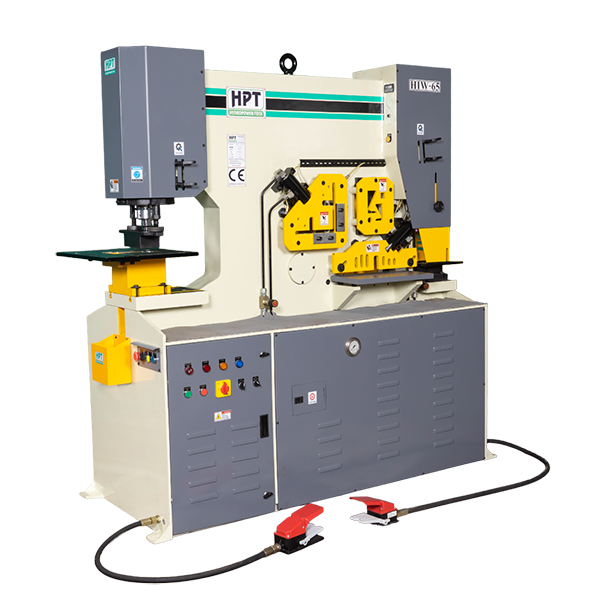If you’re stepping into the world of metal fabrication, you’ve likely heard the term “hydraulic ironworker.” But what exactly is a hydraulic ironworker, and why is it considered a must-have in fabrication shops today?
In simple terms, a hydraulic ironworker is a versatile machine designed to perform multiple metalworking tasks like punching, shearing, notching, and bending. These machines are powered by hydraulic systems, making them faster, more efficient, and safer compared to manual equipment.
In this blog, we’ll cover everything beginners need to know about hydraulic ironworker machines, including their functions, benefits, applications, maintenance tips, and how to choose the right model for your fabrication needs.
What Is a Hydraulic Ironworker?
A hydraulic ironworker is a multi-functional metalworking machine that uses hydraulic pressure to perform tasks such as:
- Punching holes in metal sheets or plates
- Shearing (cutting) metal bars, plates, and angles
- Notching corners in metal
- Bending and forming metal components
Designed for heavy-duty use, these machines significantly improve efficiency in fabrication shops by combining multiple functions into one compact unit.
Today, you can find a wide range of hydraulic ironworker machines designed for different levels of industrial and commercial use, helping businesses of all sizes speed up their operations and deliver high-precision metalwork.
Key Components of a Hydraulic Ironworker Machine
Understanding the main parts of a hydraulic ironworker machine helps beginners appreciate its versatility. Some key components include:
- Punch Station: For creating precise holes in metal sheets of different thicknesses.
- Shear Station: Used for cutting flat bars, rods, plates, and sheet metal.
- Angle Shear: Cuts various angles cleanly, essential for structural steel work.
- Notching Station: For creating V-shaped, square, or rectangular notches easily.
- Hydraulic System: The powerhouse that drives the machine’s operations using fluid pressure.
Each station is carefully engineered to perform its tasks without the need for multiple standalone machines, saving time, space, labor, and operational costs.
How Does a Hydraulic Ironworker Work?
The operation of a hydraulic ironworker is straightforward yet powerful. The hydraulic system generates immense pressure, which activates pistons to perform various metalworking tasks with incredible force and consistency.
Typical Operation Steps:
- Set up the material: Secure the metal piece safely.
- Select the tool station: Choose the appropriate die or blade based on the task.
- Operate the controls: Use the hydraulic foot pedal or hand lever to activate the motion.
- Complete the process: Perform punching, shearing, bending, or notching efficiently within seconds.
This automation not only minimizes human effort but also enhances workplace safety, reduces errors, and increases overall productivity.
Explore how fabrication machines leverage hydraulic technology to boost manufacturing performance.
Benefits of Using Hydraulic Ironworker Machines
Investing in a hydraulic ironworker machine offers numerous advantages, especially for fabrication shops aiming to boost their productivity and output quality.
Top Benefits:
- Multi-functionality: Perform several tasks like punching, notching, and bending with one unit.
- Time-Saving: High-speed operations lead to faster project completion.
- Reduced Labor Costs: Fewer operators are needed for multiple fabrication processes.
- High Precision: Achieve cleaner cuts, accurate holes, and better-quality parts.
- Enhanced Safety: Minimal manual handling of metal reduces injury risks.
- Cost-Effective: Combines multiple machines into one, lowering equipment investment.
According to industry experts at The Fabricator, hydraulic ironworkers are among the smartest investments for growing fabrication businesses.
Applications of Hydraulic Ironworker Machines
Hydraulic ironworkers find applications in a wide variety of industries, helping businesses maintain quality standards and production timelines.
Key Industries:
- Structural Steel Fabrication: Building frames, trusses, and supports.
- Shipbuilding and Offshore Construction: Cutting and shaping thick plates and angles.
- Heavy Machinery Manufacturing: Crafting machine parts, brackets, and frames.
- Automobile and Aerospace Industries: Precision punching and bending for vehicle parts.
- Custom Metal Fabrication Shops: Ideal for prototyping and small-batch productions.
Their flexibility makes them an essential tool, whether you operate a small workshop or a large industrial production facility.
Learn more about our advanced fabrication solutions designed to fit every industry’s needs.
How to Choose the Right Hydraulic Ironworker
Selecting the right hydraulic ironworker can seem overwhelming with so many models available. However, focusing on your shop’s specific needs can simplify the decision.
Factors to Consider:
- Material Type and Thickness: Ensure the machine can handle the maximum material size you plan to work with.
- Workload Volume: Choose between light-duty or heavy-duty machines based on daily usage.
- Required Operations: Identify your primary needs—punching, shearing, notching, or bending.
- Space Constraints: Evaluate the available floor space in your facility.
- Automation Features: Machines with CNC controls can offer improved precision and faster operation.
- Budget: Invest in a machine that balances price, performance, and future scalability.
If you’re unsure, contact HPT to speak with our fabrication experts and get personalized recommendations.
Maintenance Tips for Hydraulic Ironworkers
Proper maintenance ensures your hydraulic ironworker delivers peak performance year after year. Neglecting maintenance can lead to costly repairs and downtime.
Essential Maintenance Tips:
- Hydraulic Fluid: Check and replace hydraulic fluid periodically to maintain system pressure.
- Lubrication: Grease moving parts regularly to prevent rust and ensure smooth operation.
- Blade and Punch Sharpening: Inspect and replace worn-out tools to maintain cutting precision.
- Bolts and Fasteners: Tighten all connections to avoid vibrations and misalignment.
- Scheduled Inspections: Follow the manufacturer’s recommended maintenance schedule for optimal performance.
Regular maintenance not only extends the machine’s lifespan but also maintains the quality of your metalwork.
Conclusion
Hydraulic ironworker machines have revolutionized the metal fabrication industry by offering speed, precision, safety, and multi-functionality in a single compact unit. For beginners entering the field, understanding the basics of how these machines work, their key components, and their benefits is essential for making smart business investments.
Whether you’re operating a small fabrication shop or managing a large-scale industrial facility, upgrading to a hydraulic ironworker can dramatically improve your efficiency and production quality.
Ready to transform your metal fabrication capabilities? Explore our full range of ironworker machines and discover the perfect solution tailored for your business success.

